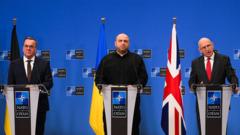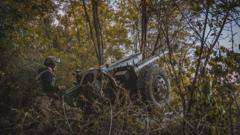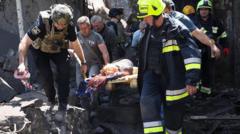In a significant show of solidarity, Ukraine's European allies have pledged €21 billion (£18.2 billion) in new military assistance, deemed essential as the war enters what has been defined as "a critical year." Officials from the Ukraine Defence Contact Group convened at NATO headquarters in Brussels to announce the provision of air defenses, missiles, and vital equipment in response to the shifting priorities in the US under former President Donald Trump.
### European Allies Commit €21 Billion in Military Aid to Ukraine

### European Allies Commit €21 Billion in Military Aid to Ukraine
European nations unite for substantial military support as Ukraine's struggle continues, marking a pivotal moment in the ongoing conflict.
German Defence Secretary Boris Pistorius revealed that Berlin would contribute €11 billion over the next four years. British Defence Secretary John Healey emphasized the need for these pledges to send a protective message to Moscow, especially as there are no signs indicating an end to hostilities, despite Trump’s claims of a potential ceasefire.
In addition to the large pledges, the support package announced includes £450 million from the UK and Norway, earmarked for radar systems, anti-tank mines, vehicle repairs, and hundreds of thousands of drones for Ukraine's defense. The UK had already committed £4.5 billion in military aid earlier this year, marking it as a leading contributor.
Air defense remains a top priority, particularly with reports indicating that Russian forces have unleashed approximately 10,000 glide bombs on Ukraine within the first three months of the year. Healey noted a striking shift in the battlefield landscape, asserting that drone warfare now accounts for a staggering 70% to 80% of battlefield casualties.
The meeting in Brussels brought together defense ministers from 50 countries for the 27th gathering of the Ukraine Defence Contact Group. US Defence Secretary Pete Hegseth attended remotely, thanking allies for their continued efforts. Hegseth's participation was described by Pistorius as dependent on schedules rather than priorities, emphasizing the significance of his involvement.
Ukrainian leadership was also represented, with President Volodymyr Zelensky joining remotely and Defence Minister Rustem Umerov present. Umerov expressed gratitude towards European allies for taking the lead in security assistance amid ongoing tensions.
Accusations were directed at Russia for its reluctance to engage in meaningful ceasefire discussions, with UK Defence Secretary Healey pointing out the month-long rejection of a US-backed peace settlement by Russia. Meanwhile, Russian defense officials claim to have taken control of the village of Zhuravka in Ukraine's Sumy region, a statement that remains unverified by Ukrainian authorities.
As the conflict continues, the situation remains highly volatile, with ongoing discussions between US envoy Steve Witkoff and the Kremlin expected to cover the pressing issue of a potential truce. Kremlin spokesperson Dmitry Peskov indicated that while discussions would occur, expectations for breakthroughs should be tempered.
In addition to the large pledges, the support package announced includes £450 million from the UK and Norway, earmarked for radar systems, anti-tank mines, vehicle repairs, and hundreds of thousands of drones for Ukraine's defense. The UK had already committed £4.5 billion in military aid earlier this year, marking it as a leading contributor.
Air defense remains a top priority, particularly with reports indicating that Russian forces have unleashed approximately 10,000 glide bombs on Ukraine within the first three months of the year. Healey noted a striking shift in the battlefield landscape, asserting that drone warfare now accounts for a staggering 70% to 80% of battlefield casualties.
The meeting in Brussels brought together defense ministers from 50 countries for the 27th gathering of the Ukraine Defence Contact Group. US Defence Secretary Pete Hegseth attended remotely, thanking allies for their continued efforts. Hegseth's participation was described by Pistorius as dependent on schedules rather than priorities, emphasizing the significance of his involvement.
Ukrainian leadership was also represented, with President Volodymyr Zelensky joining remotely and Defence Minister Rustem Umerov present. Umerov expressed gratitude towards European allies for taking the lead in security assistance amid ongoing tensions.
Accusations were directed at Russia for its reluctance to engage in meaningful ceasefire discussions, with UK Defence Secretary Healey pointing out the month-long rejection of a US-backed peace settlement by Russia. Meanwhile, Russian defense officials claim to have taken control of the village of Zhuravka in Ukraine's Sumy region, a statement that remains unverified by Ukrainian authorities.
As the conflict continues, the situation remains highly volatile, with ongoing discussions between US envoy Steve Witkoff and the Kremlin expected to cover the pressing issue of a potential truce. Kremlin spokesperson Dmitry Peskov indicated that while discussions would occur, expectations for breakthroughs should be tempered.






















